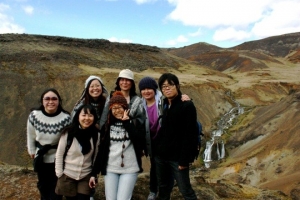I have been interested in medieval Icelandic literature and studied it in Japan since I was a high school student. After I entered the master´s program at the Hitotsubashi University in Tokyo, I wanted to go to Iceland to study more. By good fortune, I came to Iceland in autumn of 2011 as the first Japanese student who awarded the scholarship from the Watanabe Trust Fund.
I have studied medieval Icelandic literature. I have been most interested in the poem Baldrs Draumar, which is one of the Edda poems. In this poem, a god named Baldr has a nightmare and following this his father Óðinn, the king of gods, goes a realm of dead to find a deceased female prophet (völva) to ask her to tell his son’s future. The woman predicts that Baldr will die after he has been attacked by his brother and that he will be revenged by his half-brother.
To clarify how people who lived during that time thought about death and prophets, I set the themes “thanatopsis” for bachelor thesis and “prophets of medieval Iceland” for my master thesis. And now, I start the analysis Baldrs Draumar with these results of my researches.
I did part of my studies at the Árni Magnússon Institute which is the leading institute for the study of medieval Icelandic literature. Dr Guðrún Nordal, the director of this institute, agreed to be my supervisor.
I also attended a Medieval Icelandic Studies course in University of Iceland. This course is intended for foreign students who want to study medieval Iceland. The classes of this course cover a wide range of topics including not only literature but also history, linguistics, codicology, religious studies, archaeology and so on. Specialists in these subjects were our teachers.
I think the most advantageous class in this course was the class on Old Icelandic. In this class we read the mythological poems and Icelandic sagas. I use English translations of these works as material for my study. However it is also necessary to read materials in its original language, so mastering of Old Icelandic is essential for me. Though I had taught myself Old Icelandic in Japan, the study in this class significantly improved my ability. First we read Gylfaginning in Snorra Edda in autumn term and famous Icelandic sagas like Egils saga in the first half of spring term. Then we studied works like Kirkjudagsmál, Völuspá, Grágás and chivalric sagas with diplomatic or non-normalize texts. It was hard to read non- normalize texts but I would not be able to read these types of texts if I hand not taken this class.
During my stay I got the opportunity to visit the scenes of events in Icelandic sagas. This was one of the reasons for choosing to study in Iceland was my intention to do this. I could have done this on my own as a tourist, but traveling around the scenes of the saga with teachers and course students is a bit special. The explanation by teachers give the students much better understanding of how these events and the relation with the site. In the autumn we went around south Iceland which is the scene of Njáls saga . In the spring we went around west Iceland which is the scene of Gísla saga and Grettis saga. I was also able to visit the site of viking houses.
Much of my effort went into the of Medieval Icelandic Studies course, indeed, it this is natural for the student like me who came to Iceland with interest in medieval literature. In this course foreign students and visiting scholars, who are teaching in other countries, came together. The course consisted of an intensive series of lectures or presentations which the students were required to do in English.
I think the best thing for me was to be able to talk with the other students in this course about medieval Icelandic literature or history. Luckily there are other students who study medieval Iceland in my Japanese seminars, but there is no places like this course where I can talk with so many students.
I was not able to work as much on researching prophets of medieval Iceland as I had hoped. However I will now begin the research again in parallel with my study on mythological, and I will benefit from all the useful advice which I got from my teachers during my stay in Iceland.
I feel very grateful towards my teachers and classmates of the Medieval Icelandic Studies course for assisting me in a fruitful study and towards Mr. Watanabe for opportunity to study in Iceland. I will use my learning and experiences to advance my studies by I return to Japan.
Kazuho Oshima

